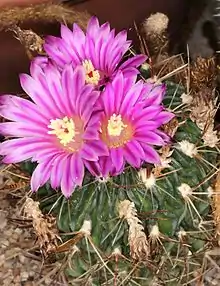Stenocactus multicostatus
Stenocactus multicostatus, the brain cactus, is a member of the cactus family native to the deserts of Mexico, and is popular in the gardening community. Though it has only been reported in the shrublands of Chihuahua, Coahuila, Durango, Nuevo León, San Luis Potosí, Zacatecas,[2] and Tamaulipas,[3] it has yet to be assessed using the IUCN Categories and Criteria because its taxonomy is still unclear.[4]
| Stenocactus multicostatus | |
|---|---|
.jpg.webp) | |
| Stenocactus multicostatus | |
| Scientific classification | |
| Kingdom: | |
| (unranked): | |
| (unranked): | |
| (unranked): | |
| Order: | |
| Family: | |
| Subfamily: | |
| Tribe: | |
| Genus: | |
| Species: | S. multicostatus |
| Binomial name | |
| Stenocactus multicostatus | |
| Synonyms[1] | |
|
List
| |
It grows up to 2.5 in (6 cm) tall, 2.4 to 4 in (6–10 cm) wide. It has nearly 100 thin ribs around the outside, each with six to nine spines. The upper spines are wider, at 1.6 to 3.2 in (4–8 cm) long, while the lower ones are shorter, at 0.2 to 0.6 in (5–15 mm) long. The flower is white to purple, 0.8 to 2 in (2–5 cm) in diameter with many stamens.[5]

References
- "Stenocactus multicostatus (Daul) A.Berger". Plants of the World Online. The Trustees of the Royal Botanic Gardens, Kew. n.d. Retrieved August 22, 2020.
- Hunt, D., Taylor, N. and Charles, G. (compilers and editors). 2006. The New Cactus Lexicon. dh Books, Milborne Port, UK.
- Martínez-Ávalos, J.G. and Jurado, E. 2005. Geographic distribution and conservation of Cactaceae from Tamaulipas Mexico. Biodiversity and Conservation 14: 2483-2506.
- Gómez-Hinostrosa, C., Sánchez , E., Guadalupe Martínez, J., Bárcenas Luna, R. & Goettsch, B.K. (2013). "Stenocactus multicostatus". 2014.3. The IUCN Red List of Threatened Species. Retrieved 2015-01-11.CS1 maint: uses authors parameter (link)
- "Brain Cactus". Desert Tropicals. Retrieved 2015-01-11.